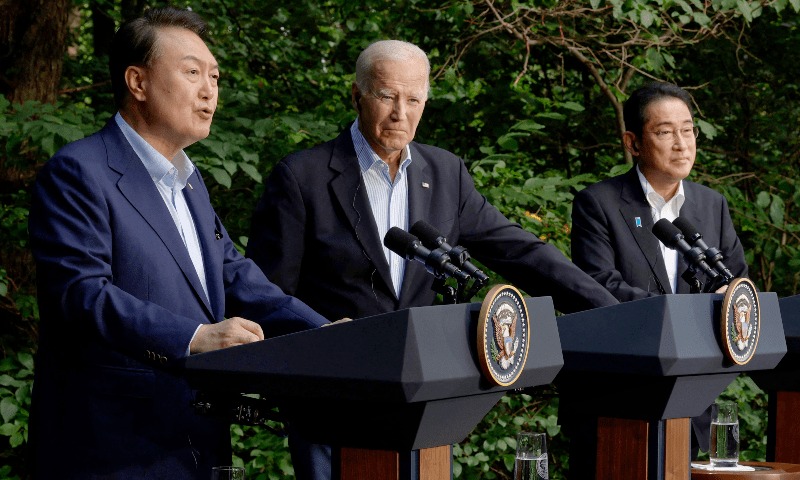In a historic display of unity, the leaders of the United States, South Korea, and Japan convened at the Camp David presidential retreat for an unprecedented summit aimed at strengthening their collaborative security efforts. However, what was intended to be a “new chapter” of cooperation quickly escalated into a diplomatic dispute as the three nations collectively criticized China’s alleged “dangerous and aggressive behavior” in maritime disputes. This landmark gathering marked a departure from the past and underscored the growing concerns over China’s actions in the Indo-Pacific region.
China’s Strong Reaction and Diplomatic Complaints
China Reacts Swiftly to Criticism: Beijing swiftly responded to the joint statement, voicing strong objections to the leaders’ characterization of its actions as “aggressive behavior.” China’s foreign ministry spokesperson, Wang Wenbin, accused the trio of leaders of meddling in China’s internal affairs and sowing discord among its neighbors.
Unprecedented Unity and Bold Steps Forward
Unity in Unprecedented Times: The summit witnessed the gathering of the US President Joe Biden, South Korean President Yoon Suk Yeol, and Japanese Prime Minister Fumio Kishida, representing a significant departure from traditional diplomatic engagements. The leaders displayed a unified stance against China’s actions, declaring their shared opposition to any unilateral attempts to alter the status quo in the Indo-Pacific waters.
China’s Allegations and Global Implications
China’s Accusations: Beijing, not mincing words, labeled the summit as an effort to revive Cold War mentality, accusing the trio of inciting division and confrontation through exclusive, closed circles. China’s assertions laid bare the extent of its concerns regarding the perceived encirclement by these powerful nations.
The Camp David summit showcased a remarkable convergence of interests among the United States, South Korea, and Japan. United in their apprehensions over China’s assertiveness in maritime disputes, the leaders highlighted the imperative of preserving regional stability and security. As the world watches, the implications of this unprecedented gathering continue to unfold, raising questions about the future of diplomatic relations and the broader power dynamics shaping the Indo-Pacific region.
















